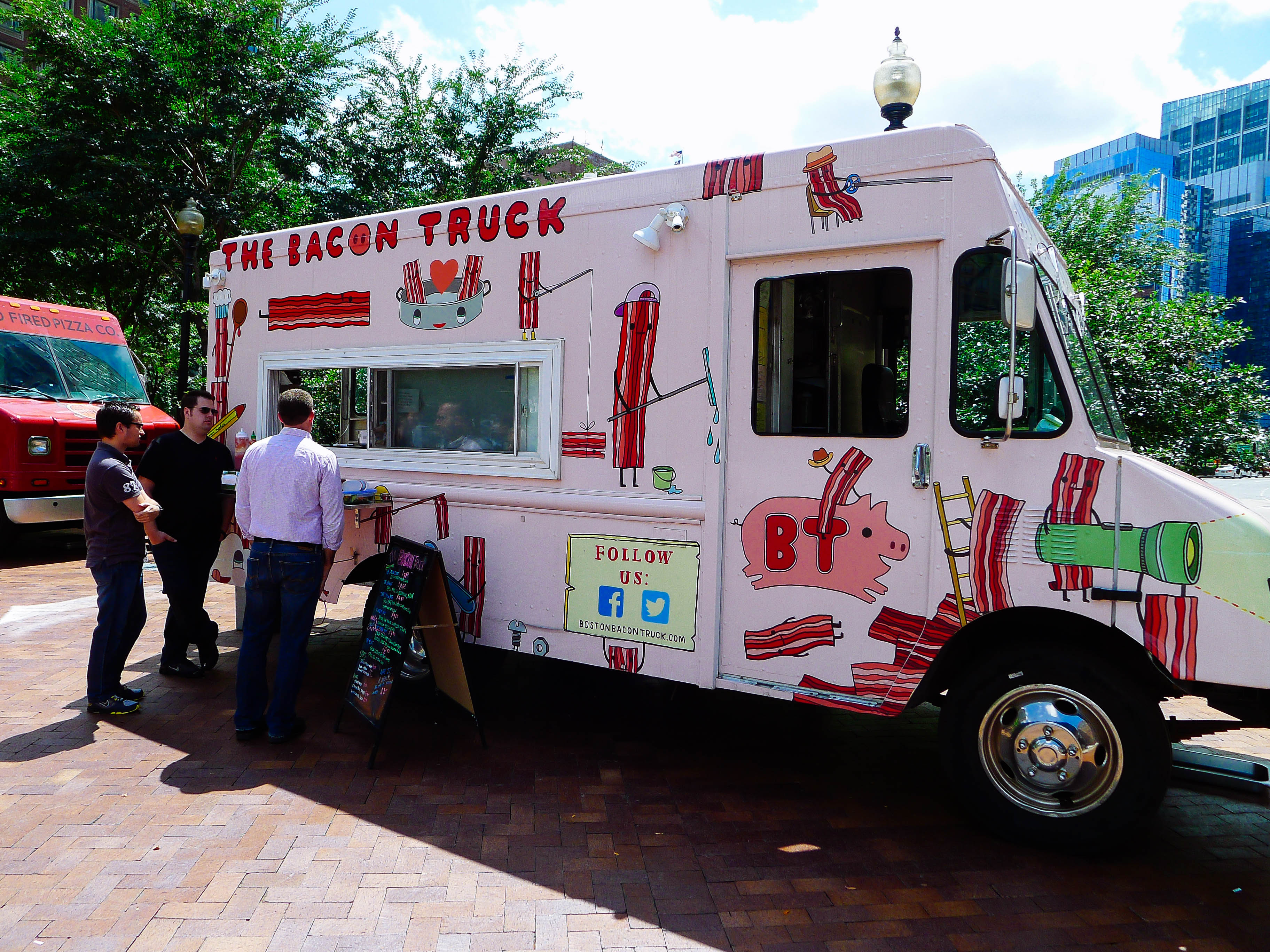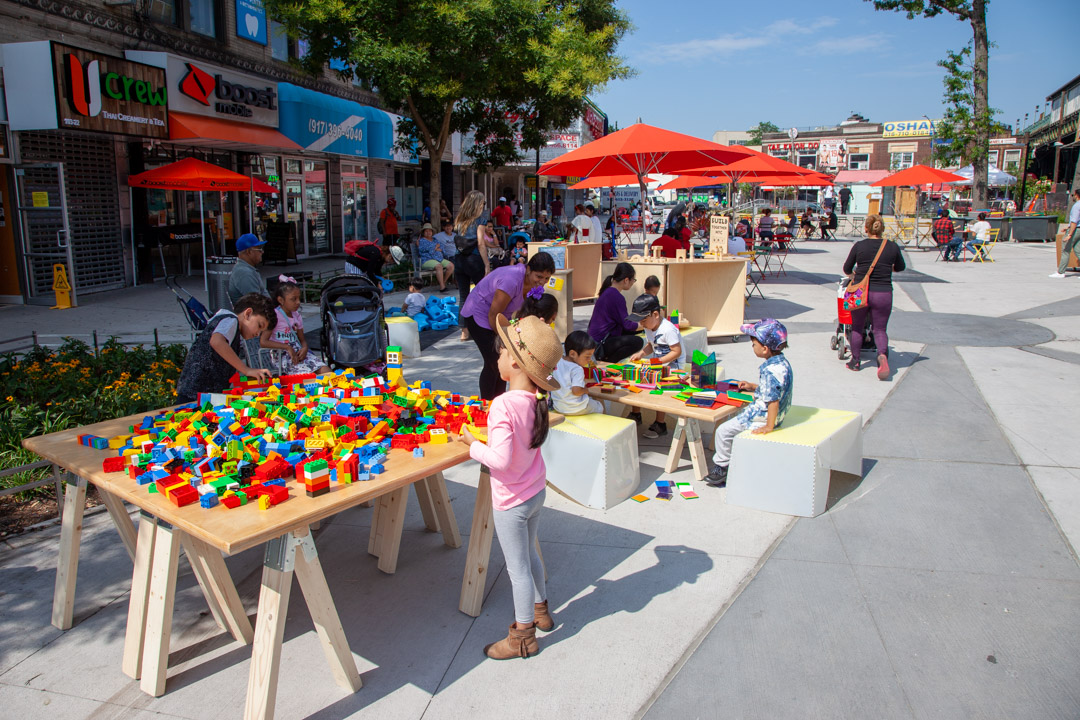[ RECOMMENDATION ]
13. Create
guidelines and programs for licensed street vendors for the activation of the
public realm.
WHY
Street vendors have been important to the fabric of New York’s neighborhoods for a long time. These microbusinesses face challenges in order to operate in our public realm— in particular, caps on general vendor licenses as well as the inevitable waiting lists and black markets that result from these caps. Additionally, there are many other important uses of the public realm, including waste management, movement of goods, people and public safety. The passing of Intro 1116 law puts in place a plan to add 400 more mobile food vendor permits every year for ten years, starting in 2022. However, a great amount of unmet need will still exist. How to balance these competing needs in the public realm fairly, legally, and openly remain important questions.
GOALS
︎ A User Experience
︎ B Long-Term Coordination
︎ C Inclusive Design
︎ D Collaboration and Communication
︎ E Support commerce and entrepreneurship
CATEGORY / TYPE
︎ Process / Regulatory Framework
︎ Funding
︎ Technical Assistance
︎ A User Experience
︎ B Long-Term Coordination
︎ C Inclusive Design
︎ D Collaboration and Communication
︎ E Support commerce and entrepreneurship
CATEGORY / TYPE
︎ Process / Regulatory Framework
︎ Funding
︎ Technical Assistance
Shrima Pandey, Jackson Heights resident
HOW TO IMPLEMENT
First, the City would need to acknowledge that licensed street vendors are microbusinesses. These entrepreneurs in our public realm activate our streets, sidewalks and plazas—often, for longer hours each day than brick-and-mortar storefronts. With this acknowledgement, key City agencies such as the DOT, the Department of Small Business Services, the Department of Health, and the Department of Consumer and Worker Protection would need to partner, perhaps through the Public Realm Working Group (see previous recommendation), to:
︎ Develop a suite of tools and resources to support and manage vendors in the public realm, such as multilingual training sessions and guidelines on where and how to effectively operate in the public realm, including information on alternative available permits and available concessions RFPs for plazas and Open Streets.
︎ Develop a clear map of potential vending areas in commercial districts with special designations, support, and regulation.
︎ Appoint street vendor liaisons (by borough) who would serve as an ombudsman between the previously identified City agencies and local street vendors.
︎ Develop a suite of tools and resources to support and manage vendors in the public realm, such as multilingual training sessions and guidelines on where and how to effectively operate in the public realm, including information on alternative available permits and available concessions RFPs for plazas and Open Streets.
︎ Develop a clear map of potential vending areas in commercial districts with special designations, support, and regulation.
︎ Appoint street vendor liaisons (by borough) who would serve as an ombudsman between the previously identified City agencies and local street vendors.
These resources should be made available on a dedicated “Street Vendor” page on the City’s website (administered in partnership by the Department of Small Business Services, and the Department of Consumer and Worker Protection). It should remain the central repository for all updates on regulations and programs impacting our public realm street vendors.
In the long term, the City should consider allowing CBOs or a consortium of permitted vendors to apply to manage "designated vending zones" that promote new and innovative vending practices.This would support strong vending practices and would protect other public realm interests. The permit should allow for flexible site-planning on sidewalks, streets, and other public spaces to be managed by a community-based organization. Participating street vendors would have access to other permits and thus not be subject to statutory vending caps.
Care should be taken to formalize the “natural occurring” markets where vendors congregate but don’t have a CBO or plaza management partner, i.e. Corona Plaza, and not relocated to marginal sites. Revenue from vendors, in the form of market charges, a percentage of sales, or another metric, can be used for market maintenance, cleaning, sanitation removal, commissary space, and other public amenities.
Case Study ︎︎︎ Case Study ︎︎︎ Case Study ︎︎︎

Food Truck Vending Program
City of Cambridge, MAThe City of Cambridge
Food Truck Program demonstrates an administration’s acknowledgement that street
vending is an entrepreneurial opportunity and an additional street-level
amenity on Cambridge’s public spaces. The program helps incubate food truck
businesses, with a focus on women- and minority-owned businesses and first-time
food truck operators, by dedicating specific vending spots across the City at a
low cost (typically $30 to 50 per shift of four to six hours) to program
participants. This enables street vendors to easily operate in compliance with
City regulations (program administrators provide permitting and licensing
support) in prime locations (popular street corners, parking spaces near large
plazas) that would otherwise be difficult to secure.
Corona Plaza Project
City of New York, NY
“The Corona Plaza Project” demonstrated the effectiveness of simply mapping
out and designating key spots within a single location for street vendors to be
able to operate cohesively with one another. This stakeholder-driven solution was
led by street vendor liaisons who communicated directly with the relevant
enforcement entities: the Department of Health and Mental Hygiene, the
Department of Consumer and Worker Protection, and the local police precinct.

︎︎︎ Executive Summary
︎︎︎ Introduction
︎︎︎ The Brief/Challenge
︎︎︎ Understanding the Regulatory Landscape
︎︎︎ Sidewalks
︎︎︎ Streets
︎︎︎ Plazas
︎︎︎ Navigating the Current Regulatory Process
︎︎︎ Adapting to the Pandemic
︎︎︎ Introduction
︎︎︎ The Brief/Challenge
︎︎︎ Understanding the Regulatory Landscape
︎︎︎ Sidewalks
︎︎︎ Streets
︎︎︎ Plazas
︎︎︎ Navigating the Current Regulatory Process
︎︎︎ Adapting to the Pandemic
︎︎︎ Enhancing the City’s Approach to Public Space Management
︎︎︎ Recommendations
︎︎︎ Appendix
︎︎︎ Credits
︎︎︎Watkins Public Space
︎︎︎What’s Up, Jamaica!
︎︎︎ Recommendations
︎︎︎ Appendix
︎︎︎ Credits
︎︎︎Watkins Public Space
︎︎︎What’s Up, Jamaica!
